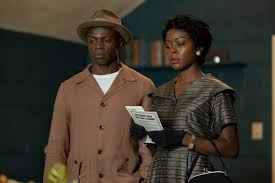When it comes to bringing significant historical events to the big screen, the key to doing so and making them effective is the approach that each respective filmmaker takes in retelling their stories. The story of Emmet Till is one that carries heavy weight in showing how a horrific tragedy that left a young mother without a child, ultimately became the catalyst for change. While it's a profoundly moving story that serves as being a painful reminder of America's troubled past, it also speaks to the systemic racism that plagues American society in present day. With Till, the filmmakers make the bold choice of reframing story through the eyes of his mother, Mamie Till-Bradley with Emmet's murder being shown through her perspective. The end result is an emotionally absorbing and haunting drama that's well-executed and brilliantly acted.
Based on true events, Till tells the story of Mamie-Till-Mobley's relentless pursuit of justice for her 14-year old son, Emmet Till, who was brutally lynched in 1955 while visiting his cousins in Mississippi. Emmet's story is significant in how it helped spark the birth of the civil rights movement. Such a profoundly heartbreaking story demands the full dedication of those involved in bringing it to the screen in the most effective way possible. Thankfully that's the case here as Till's story is handled with a tremendous amount of care and filmed with a clear eye on not just revisiting such a horrific tragedy that played a significant role in reshaping American history, but also giving it a timely relevance in the era of George Floyd. While it finds itself being uncomfortable viewing at times, Till remains focused on its intent of showing a mother's grief and her continued push to seek justice which sadly never emerged.
It can be said that much of Till's power comes from the devotion put forth by its cast, particularly Danielle Deadwyler's remarkable performance as Mamie-Till. She masterfully conveys a mother's shock, heartbreak, and anger over her son's murder, as well as the lack of accountability towards those responsible for his lynching. While the rest of the casts performances are good, it's Deadwyler's work that drives the film and is what connects the audience to the tragedy of Till's murder. Despite his role being brief for obvious reasons, Jalyn Hall impresses as Emmett with his performance adding to the devastation the audience feels upon witnessing his murder. His scenes with Deadwyler are undoubtedly touching with both truly feeling like they're mother and son. Other noteworthy performances include Frankie Faison as Mamie's father John Carthan, Haley Bennett as southern shopkeeper Carolyn Bryant, whose accusations led directly to Emmett's murder, Whoopi Goldberg as Mamie's mother Alma Carthan, Jayme Lawson as Jayme Lawson as Civil Rights activist Myrlie Every with Toslin Cole as her husband and activist Medgar Evers, and Sean Patrick Thomas as Mamie's husband, Gene Mobley.
Till's directing by Chinonye Chulwu is commendable with how she's able to recreate the mood and and atmosphere of 1955 Mississippi. The costume and set designs appropriately fit the stories era with composer Abel Korzeniowski crafting a deeply haunting and emotional score that's both equally crushing and hopeful. At 2 hours and 10 minutes, Till moves slow but never feels boring with the audience becoming immersed in the story. In depicting Emmet's brutal murder, Chulwu only goes as far as showing the kidnapping of Till by his murderers while leaving the rest up to imagination with only showing the barn where he was tortured from a distance with sounds implying the beating. The disfigurement of Till's body is shown in brief glimpses that enhance the murders shock factor, along with presenting some of the films most powerful moments regarding Deadwyler's phenomenal performance. As a whole, Chulwu does a fine job of transporting audiences back, while giving the cast complete freedom to deliver the best performances possible.
Reframing Emmet's murder and telling it through the perspective of Mamie-Till adds a tremendous amount of weight to the film with her character going from being a regular mother to becoming a civil rights activist, who made America confront her son's horrifying murder. This is evident by her characters powerful speech at the end where she acknowledges that she went from being someone who didn't pay much attention to other racially motivated murders happening to galvanizing the civil rights movement with her declaring: "What happens to any of us, anywhere in the world, had better be the business of all of us." The script does a masterful job of establishing the relationship between Emmet and his mother in the films first act, while laying out the sequence of events that leading up to Till's murder such as his encounter with Carolyn Bryant at the grocery store and the warnings he received from his cousins (His mother included) about not intimidating whites. The film comes with shocking revelations regarding the case such as the appalling attitude that Mamie received during the trial, or the discovery that Mamie's uncle Mose actually had a gun in their home when Emmet was abducted, but didn't do anything out of fear that his own family would be harmed along with retaliation occuring towards blacks in Mississippi.
Overall, Till's script does a fantastic job of retelling an emotionally devastating story of a mother's transformation into a fighter for justice while doing so in a way that's informative. Not everyone will embrace it as its subject matter will prove to be unsettling for many, but Till's story is one that commands to be seen at least once to understand the full grasp of a tragedy that undoubtedly became a cry for change. It's a shame that such an important message that was admirably well-told was completely shunned by the Academy as Danielle Deadwyler's incredible performance deserved better.
Final Verdict: See it but be prepared to be disturbed, angered, and ultimately moved by the experience.
Images Courtesy Of Universal Pictures














No comments:
Post a Comment